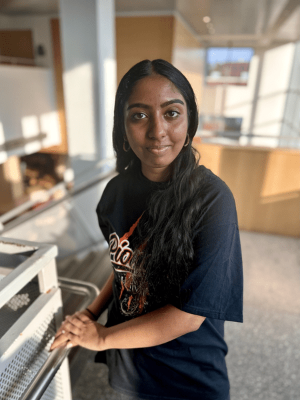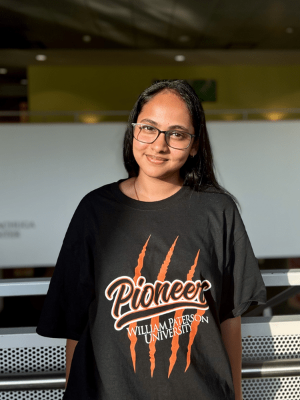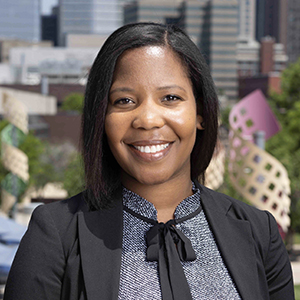In an election year filled with high political discourse, students and faculty at William Paterson University are increasing efforts to drive political engagement on campus.
While specific plans for the fall semester are still unfolding, student leaders and university staff are already organizing voter registration drives and tabling events to simplify the registration process for students. These events are huge in ensuring that students can easily register to vote and participate in the upcoming elections.
“Universities can organize voter registration drives and tabling events where students can easily register to vote,” said Sowmya Kovvuri, a Student Government Association (SGA) member.

“Hosting open forums and debates on campus also allows students to discuss and voice their opinions on various issues.”
Adding to these efforts, Sehaj Osan, the university’s SGA Vice President of Student Life, highlighted the SGA’s plans. “We’ll be rolling out voter registration drives and organizing discussions on key issues. These initiatives are vital, especially in an election year, to ensure that every student’s voice is heard.”

Student government leaders believe political engagement on campus is more than just a civic duty; it’s a vital aspect of student development
“Getting students involved politically is crucial as it prepares them to be informed voters and active citizens,” Kovvuri said. “Before joining SGA, I was not familiar with the political process. But now, I have a bit more knowledge about it, which makes it easier for me to speak up and be more involved.”
“Political involvement matters deeply because it empowers us to shape the world around us,” emphasized Osan. “By engaging politically, we can advocate for issues that matter to us and drive meaningful change in our communities.”
Overcoming Barriers to Participation
Despite the efforts to increase political engagement, students often face barriers such as lack of information, timing, and accessibility issues. Many students feel disconnected from politics or believe their vote doesn’t matter, while others may not know how to register or find reliable information.
“To overcome these barriers, universities should incorporate discussions about elections in relevant classes, such as history and political science,” Kovvuri said. “Providing resources and hosting events that focus on the elections, offering incentives like extra credit for attendance, can also increase engagement.”
“I understand that there are barriers to getting students involved politically, such as feeling disconnected from the process or overwhelmed by the complexity of issues,” Osan said. “To address this, we’re working on improving accessibility, making sure that students have the resources and support they need to participate fully.”
Faculty members are also playing a pivotal role in fostering political engagement. Stephanie Puello is an incoming Assistant Professor of Public Administration at the University of Miami. She noted the importance of political education and the role universities play in this process.
“It’s important to get younger folks involved because policies that may pass sooner will obviously affect their livelihood,” Puello said. “Universities are well-positioned to serve as a channel for students and the local and external communities.”

First-time voters face unique challenges, like navigating the registration and voting process, sensitivity to misinformation, and peer pressure. However, they also bring fresh perspectives and energy to the political process.
“Encouraging open discussions and support, as well as providing clear, accessible information about voting procedures, can help mitigate these challenges,” Kovvuri noted.
As Osan observed, “As first-time voters, many of my peers may feel uncertain or overwhelmed by the prospect of participating in the political process. But it’s also an incredible opportunity to make our voices heard and shape the future we want to see.”
Building a Culture of Engagement
Ultimately, fostering a culture of political engagement on campus requires an innovative approach. This includes organizing events, providing resources, and encouraging discussions both within and outside the classroom.
“Being able to discuss your viewpoints, listen to others, and expand your perspective is crucial,” Puello said. “Universities are great places for this kind of engagement, bringing together people from diverse backgrounds and viewpoints.”
“To my peers and fellow students, I would say: don’t underestimate the power of your voice and your vote,” Osan advised. “Take the time to educate yourself on the issues, get involved in organizations that align with your values, and don’t be afraid to speak up and advocate for what you believe in.”
As William Paterson University continues to ramp up efforts to engage students politically, the campus community is hopeful that these initiatives will lead to higher voter turnout and a more politically active student body.
With the impending election, political education has never been more important. Educators and advocacy organizations are focusing on providing factual, research-based information to counter misinformation presented on social media.
“Political education is important at all times, but especially now,” Puello emphasized. “Understanding the processes, like how to register to vote, where to go, and the deadlines involved, is crucial for ensuring informed participation.”
James Alain is a contributing writer for the Beacon.